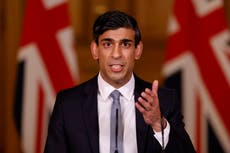The same old Tory tactics – equality was completely ignored in Rishi Sunak’s Budget
This Budget needed to right the wrongs of the last decade, but the chancellor did not mention inequality once in his speech

Your support helps us to tell the story
From reproductive rights to climate change to Big Tech, The Independent is on the ground when the story is developing. Whether it's investigating the financials of Elon Musk's pro-Trump PAC or producing our latest documentary, 'The A Word', which shines a light on the American women fighting for reproductive rights, we know how important it is to parse out the facts from the messaging.
At such a critical moment in US history, we need reporters on the ground. Your donation allows us to keep sending journalists to speak to both sides of the story.
The Independent is trusted by Americans across the entire political spectrum. And unlike many other quality news outlets, we choose not to lock Americans out of our reporting and analysis with paywalls. We believe quality journalism should be available to everyone, paid for by those who can afford it.
Your support makes all the difference.A year into the pandemic, inequality is deepening on Boris Johnson’s watch.
Covid-19 has disproportionately impacted older, disabled, Black and Asian people and had huge socioeconomic consequences for women, so monitoring equality impacts has rarely been more important.
Despite this, you can count on one hand the number of equality impact assessments published since last March.
Yesterday’s Budget proved no exception. With the worst economic crisis of any major economy, this Budget needed to right the wrongs of the last decade. But no impact assessment was published alongside the Budget and the chancellor did not mention inequality once in his speech.
If he had bothered to look more closely at what his policies mean for people already suffering the worst consequences of the virus, he would find worrying patterns.
The failure to give parents the right to request furlough has seen mothers disproportionately juggling their paid work with unpaid childcare while schools are closed. This has consequences for their employment and income. With gender pay-gap reporting still suspended and the government ignoring calls for ethnicity pay-gap reporting, we have no way to measure the impact on economic equality.
Meanwhile, both the furlough and self-employment income support schemes are still discriminating against pregnant women. About 70,000 new mothers have seen their income support payments docked because of maternity leave while many pregnant women have been placed on sick pay instead of furlough due to unclear guidance. The chancellor failed to amend the SEISS for the fourth and fifth payments.
For those who have already lost their jobs, the chancellor has only delayed a cut to financial support by extending the £20 uplift to universal credit for just six months. This will create huge uncertainty and financial hardship for growing numbers of unemployed people who are more likely to be Black, Asian or ethnic minorities.
If you are one of the 1.9 million disabled people claiming Employment Support Allowance, the chancellor has discriminated against you by choosing not to increase these payments by £20, in line with universal credit. This will come as a devastating blow to disabled people.
The chancellor’s latest “Plan for Jobs” needs a robust equality impact assessment or it risks leaving industries with higher representations of women and ethnic minorities, like care and creative industries, out in the cold.
More should be done, not only to guarantee Kickstart, Restart, and recovery grants support women, but also to reduce these occupational disparities which see women funnelled into lower-paid, lesser-valued work in the first place. We need smart furlough accompanied by training opportunities. Labour’s jobs promise would deliver better jobs for all young people.
Yesterday, the chancellor promised to be “open and honest” but behind the flashy sales pitch and gimmicky graphics, he is hiding the impact on equality groups. This was the same old Tory tactics, completely ignoring the impact of economic policy on different groups of people resulting from centuries of racism and sexism.
The pandemic is turning back the clock on economic equality for women, Black, Asian and ethnic minority people and disabled people while the government stands idly by, failing in their legal duty to promote equality.
This is exactly what we were aiming to avoid when the last Labour government introduced laws which mean that all public bodies have to think about equality of women, disabled people, ethnic minorities and other marginalised groups when they make policy.
Now is the time to be dialling up these protections through gender and ethnicity pay gap reporting, equality impact assessments and redundancy protections, not delaying them further.
If the chancellor was serious about the country’s recovery from coronavirus, he should have put equality front and centre of his Budget plans.
Marsha de Cordova is the shadow women and equalities secretary and the Labour MP for Battersea



Join our commenting forum
Join thought-provoking conversations, follow other Independent readers and see their replies
Comments